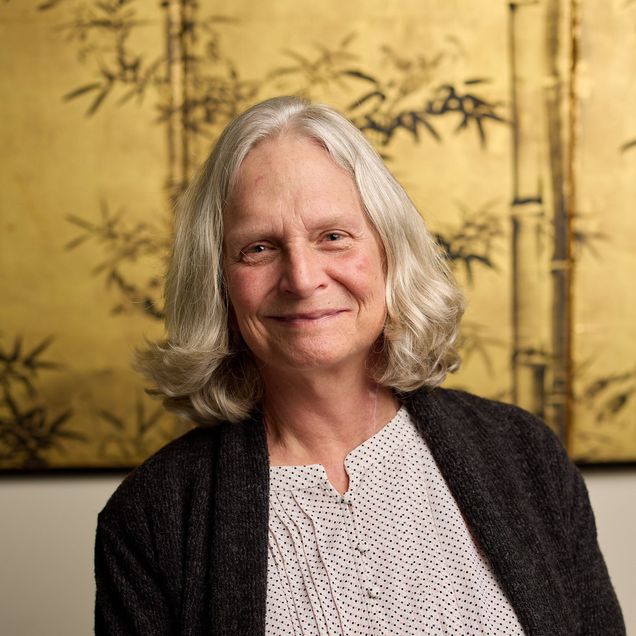 In an era of widespread misinformation, Pendred (Penny) Noyce, MD, and her husband, Leo X. Liu, MD, believe that the rigorous critical thinking essential to science is key to preserving a free and multicultural society.
In an era of widespread misinformation, Pendred (Penny) Noyce, MD, and her husband, Leo X. Liu, MD, believe that the rigorous critical thinking essential to science is key to preserving a free and multicultural society.
“Science is a good venue for starting to talk about misinformation, because it is possible to discern truth,” Penny says. “This has led me to believe that there is a teachable thing called ‘critical thinking,’ which is necessary for civil civic debate.”
Penny—who earned a BA in biochemistry from Harvard University and an MD from Stanford University School of Medicine—has been focusing on the intersection of science and critical thinking in her professional and philanthropic work for decades.
“Looking at the big issues our country and the world face—like climate change, authoritarianism, racism, and xenophobia, which may intersect in some ways—our future citizens need to be able to think clearly and cut through lies,” she says.
This belief inspired Penny and Leo to become the first major supporters of the Public Scholarship Shop, an initiative of Boston University’s Center for Antiracist Research. The Public Scholarship Shop will forge relationships between the Center’s scholars and the media, with the goal of making scholarly writing and research accessible to a broad audience. Faculty will be trained in pitching stories to reputable public-facing media outlets and connecting with editors, producers, and literary agents, so their pathbreaking antiracism work can be disseminated beyond the academy and into the public sphere.
Penny’s educational philanthropy dates back to her founding of the Noyce Foundation, created by her family in 1990 to honor the memory and legacy of her father, Silicon Valley pioneer Dr. Robert N. Noyce—co-founder of Intel and inventor of the integrated circuit, which fueled the personal computer revolution. One of the foundation’s priorities was to build the field of after-school science through research, advocacy, and capacity-building, so that many more children can have fun and inspiring experiences in science and engineering programs outside of school.
Penny has carried on the Noyce Foundation’s legacy as editorial director of Tumblehome Learning, which she created to immerse children in STEM education with books that combine science and literature. Tumblehome has since expanded its offerings to include workshops and learning materials, and it has recently launched a new program, Get Ready for AI: Artificial Intelligence Education for K–12.
Leo, too, is dedicated to bringing a love of science to children. Since 2003, he has served as a trustee of the Museum of Science, and he chaired the task force for conceptualizing the museum’s Hall of Human Life, an interdisciplinary exhibition of human biology and medicine that opened in 2013.
Penny and Leo learned about the Center through their shared admiration of its founder and director, Dr. Ibram X. Kendi. Among his many accomplishments, Dr. Kendi is the best-selling author of Stamped from the Beginning: The Definitive History of Racist Ideas in America, which won the National Book Award for Nonfiction in 2016. He is also the Andrew W. Mellon Professor in the Humanities at BU.
At the Center, Dr. Kendi established the COVID Racial Data Tracker, which was the nation’s premier source of racial and ethnic demographic data as a means of understanding the outbreak among those hardest hit by the pandemic, people of color. Penny used data from the Tracker in a recent book she wrote for middle schoolers that focuses on the COVID pandemic.
She eventually became aware of the Center’s Narrative Office, home of the Public Scholarship Shop and of The Emancipator. A digital reimagining of America’s first abolitionist newspaper, this Center-initiated collaboration with The Boston Globe’s opinion team provides a new and vibrant platform for antiracist scholarship and opinion pieces.
“Like many other people, we have been shocked and concerned at the resurgence of overt racism in this country,” Penny says. “My hope is that the shop will find ways to bring knowledge and understanding to people in ways they can hear, without being overly dogmatic.”
She is keen that the Public Scholarship Shop will help raise a generation of scholars and journalists who excel at communicating complex research and scholarship to the public.
“All of us who have benefited from growing up in a free and multicultural society have a responsibility to try and nurture that,” says Penny. “Scholarship and clear communication will allow that to continue into the coming—and very challenging—century.”
